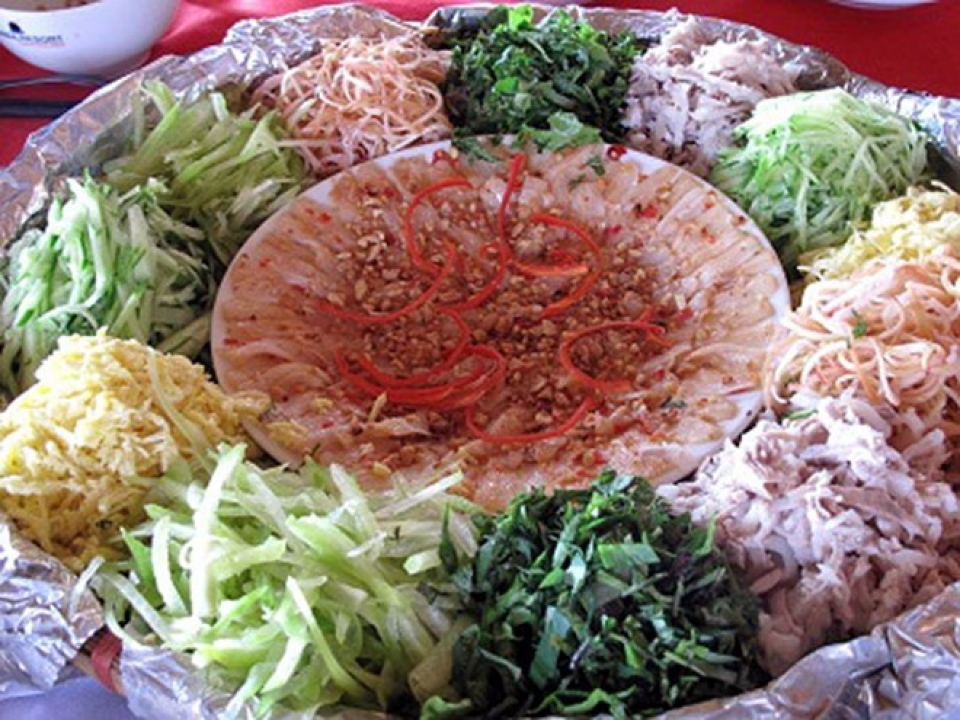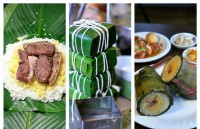
Five savory signature local dishes in Bac Giang province
Latest
| TIN LIÊN QUAN | |
| Excavation digs up artifacts in ancient temple | |
 |
| Raw fish ceviche. (Photo: baobacgiang.com.vn) |
Frogs can be cooked into various dishes. Stir-fried frog is easy to make and is palatable to people with various tastes. For the dish, frog legs are mainly used and cooked with blumea lanceolaria, piper sarmentosum and tuong (fermented bean paste).
Meanwhile, the whole frog is minced and mixed with eggs, cloud ear fungus, scallion, salt and pepper to make fried chopped frogs. The mixture is then rolled into balls, which are then deep-fried. This dish is served with various kinds of veggies and dipping sauce.
Stuffed frog is made of the same ingredients with fried chopped frogs; however, its recipe is a little bit more intricate. Frogs’ skin is removed deftly while frog meat and bones are finely chopped up and combined with eggs, cloud ear fungus, scallion, salt and pepper. The blend is used as belly stuffing, which will be steamed and deep-fried.
“Goi ca me”, a raw fish ceviche made of Osteochilus fish, requires an experienced and meticulous gourmet to cook it right. The cook needs to carefully prepare the ingredients. They have to soak raw fish fillets in rice alcohol for 2-3 minutes, take them out to let dry, remove all the bones, drain and wrap them with paper towel, and keep them inside rice storage for 2-3 hours.
The well-drained fillets are then sliced into thin, big pieces with a sharp knife, with the skill removed. The fillets are put in a large bowl, well mixed with galingale powder and roasted rice flour mix, and wrapped in paper to marinate.
Not only making the dish but also enjoying it is an art.
The dish is served with rice papers or leaves of loc vung, sung, and vong cach trees. The fish piece is rolled with a rice paper or the said-above leaves and dip into a special thick sauce, which is made from finely-chopped fish head, galingale extract, tuong (fermented soybean paste), me (fermented rice) and salt. It will be even better when having the dish with a cup of traditional rice wine made in renowned Van village.
Meanwhile, “nom ca” is a raw fish salad made of Osteochilus fish or carp fish. The clean fish has all of its bones removed and its fillets are cut into strips, which are mixed with chopped tram den (black fruit fillings), young banana bulb, ginger leaves, sour star fruits, tuong and other seasonings.
The dish is served with sung leaves to increase the taste. It is usually made during the season of tram den in August and September as the fruit is the key, indispensable ingredient that creates the delicious signature flavor of the dish.
To make simmer eel, fried soya curds, sliced pork belly, slashed bananas, cintronella, fermented soybean paste and other seasonings are needed. Eels are cleaned, cut into short pieces then simmered with the accompanying ingredients. When served, the dish should have the aroma of cintronella, fermented soybean paste, fermented rice, and mouthwatering eel pieces.
Nem nuong, or grilled pork sausage, is made of lean meat and pork rind. Thin strands of pork rind and lean meat are mixed with roasted rice flour, salt and ground pepper. Young guava leaves are rolled between meat and vong leaves. The pork sausage is wrapped in dried banana leaf as the inner layer and fresh banana leaf as the outer layer and left for one day. It must be grilled finely before being served.
 | Tet food reflects different lifestyles The three main regions of Vietnam are characterized by different climate and soil conditions that result in different traditions and customs, and some of these ... |
 | Metropole recreates Hanoian old market In the days leading up to the Lunar Year of the Dog, Sofitel Legend Metropole Ha Noi will host a festive open-air bazaar featuring more ... |

















